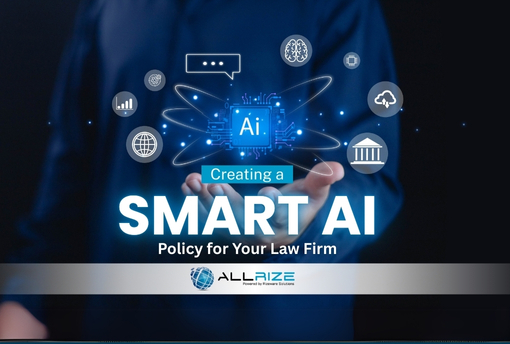Artificial intelligence (AI) use is becoming more and more common in the practice of law. However, few law firms have AI policies in place that guide usage. A well-structured AI policy helps mitigate risks, ensure client information is protected, and minimize uncertainty for staff. Here’s what every law firm’s AI policy should include:
1. AI Training and Competency Requirements
Lawyers and staff should be adequately trained on AI tools to use them effectively and ethically. The policy should mandate ongoing education and training sessions to keep attorneys informed about the capabilities and limitations of AI.
2. Permitted and Non-Permitted Use
The policy should define the specific AI tools and applications permitted for use within the firm. This includes legal research platforms, contract analysis software, AI-driven chatbots, document automation systems, generative AI tools, and more. The policy should also clearly define specific tasks and/or tools that are not permitted for use. The firm should establish a process to clarify use cases, approve new tools, and phase out old tools.
3. Compliance with Ethical and Regulatory Standards
AI use triggers a number of ethical duties in a way that few other technologies do. Law firms should exercise extra care in ensuring adherence to ethical guidelines, especially their state bar’s guidelines. If your state does not yet have AI guidelines, you can rely on the American Bar Association’s (ABA) guidelines. The policy should explicitly cover:
- Competence
- Confidentiality
- Communication
- Fees
As the ABA and state bars develop and iterate on guidelines, it is crucial to revisit your policy annually to ensure it reflects the latest standards.
4. Data Privacy and Security Measures
AI applications often process sensitive client information, so firms need strong data protection protocols that govern data access both inside and outside the firm. The policy should outline encryption requirements, data retention periods, and measures to prevent unauthorized access to AI-generated content.
5. Transparency and Disclosure Requirements
Attorneys should keep record of when AI is used in legal work, especially in contract review, research, or document drafting. Disclosure to clients may be required depending on your state bar’s rules. For example, California’s guidance states that lawyers should consider disclosure to their clients, while Alabama requires lawyers to disclose the methodologies, costs, and limitations of AI to clients. Your AI policy should specify requirements for tracking AI use and procedures for disclosing to clients and courts.
6. Human Oversight and Validation Requirements
AI is not yet perfect, and is still vulnerable to errors and hallucinations. It is critical that attorneys have processes in place to conduct oversight and validate outputs by AI systems. Your policy should clearly state which AI activities require human checks, and which activities don’t. The policy should also clarify that any work product created with the assistance of AI tools is ultimately the responsibility of the attorney.
7. A Strong Cyber Defense
Bad actors are increasingly using AI technology to launch automated attacks on the Large Language Models (LLMs) that law firms rely on to extract maximum value from their AI tools. Successful attacks can result in exposure of confidential data, business disruption, and damage to the reputation of the firm. For that reason, every firm should invest in an IT infrastructure that provides a strong defense against cyberattacks.
8. Incident Response Procedures
Like any technology, AI tools may make mistakes, experience outages, or suffer from a data breach. AI output is only as good as the input, and human error remains a vulnerability with AI use. The policy should outline disclosure requirements in the case where an attorney discovers an error has been made or when a breach has been detected. These disclosure requirements should cover internal disclosures and disclosures to the client.
AI Policy Review and Updates
Since AI technology is rapidly evolving, law firms should regularly review and update their AI policy to address new risks and advancements. Each review should take into consideration the advancements in AI capabilities, as well as updated guidance from state bars and regulators. Establishing a review committee or designating AI governance personnel can ensure ongoing compliance and improvements.
Conclusion
An effective AI policy provides law firms with a roadmap for responsible and strategic AI use. Without a policy, law firms are at risk of breaching ethical guidelines, breaking duties to the client, and creating confusion with staff. As AI continues to shape the legal industry, a proactive AI policy will be essential for law firms to navigate this technological shift responsibly.

